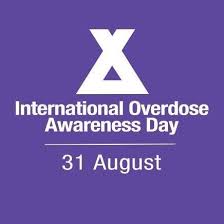Overdose Awareness Day offers opportunity to remind people to carry naloxone, opioid overdose reversal drug

By Melissa Patrick
Kentucky Health News
Each year, the last day of August is observed as International Overdose Awareness Day, to raise awareness of substance use disorder and overdoses, reduce stigma and acknowledge the grief felt by families and friends who have lost someone to drug overdose.
“As we recognize Overdose Awareness Day here in the commonwealth, we remember all those we have lost – each one a beloved child of God who is missed by their families, friends and communities,” Gov. Andy Beshear said.
In honor of the day, Beshear ordered that flags at all state office buildings be lowered to half staff on Saturday, Aug. 31, and the Governor’s Mansion was lit in purple, the color designated to show support for overdose awareness.
At a Aug. 29 news conference, Beshear also thanked first responders for their ongoing work to save lives from overdoses every day.
“The answer to how many times we should revive someone who’s overdosing is every single time,” he said. “That is someone’s loved one. That is someone’s world. That is someone’s father, mother, son, daughter, friend, cousin, aunt or uncle.”
Beshear encouraged all Kentuckians to be prepared to save a life by carrying the opioid overdose reversal medication called naloxone, also known by its brand name Narcan. Naloxone can be found in more than 400 locations across Kentucky. To find a location that provides naloxone free of charge, go to findnaloxone.ky.gov
“You don’t need a prescription,” he said. “So anyone can carry this medicine with them so that you can be prepared to save a life.”
The Centers for Disease Control and Prevention reports that one study found that bystanders were present in more than one in three overdoses involving opioids.
Linda Squire, a mother from Louisville who lost her 25-year-old son to an overdose in 2015, thanked the Beshear administration for its advocacy on this issue.
“Kentucky has led the way in overdose awareness and prevention,” she said. “We are doing our part to stop the stigma, to increase opportunities for treatment and recovery and give hope to those that are still struggling.”